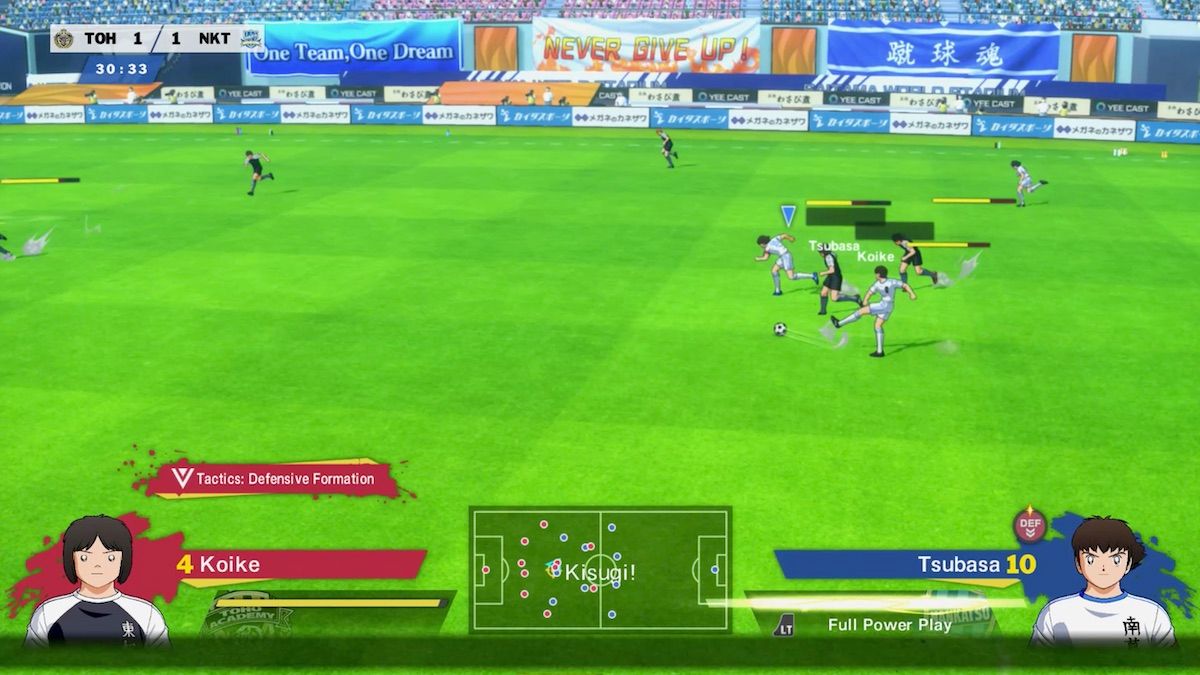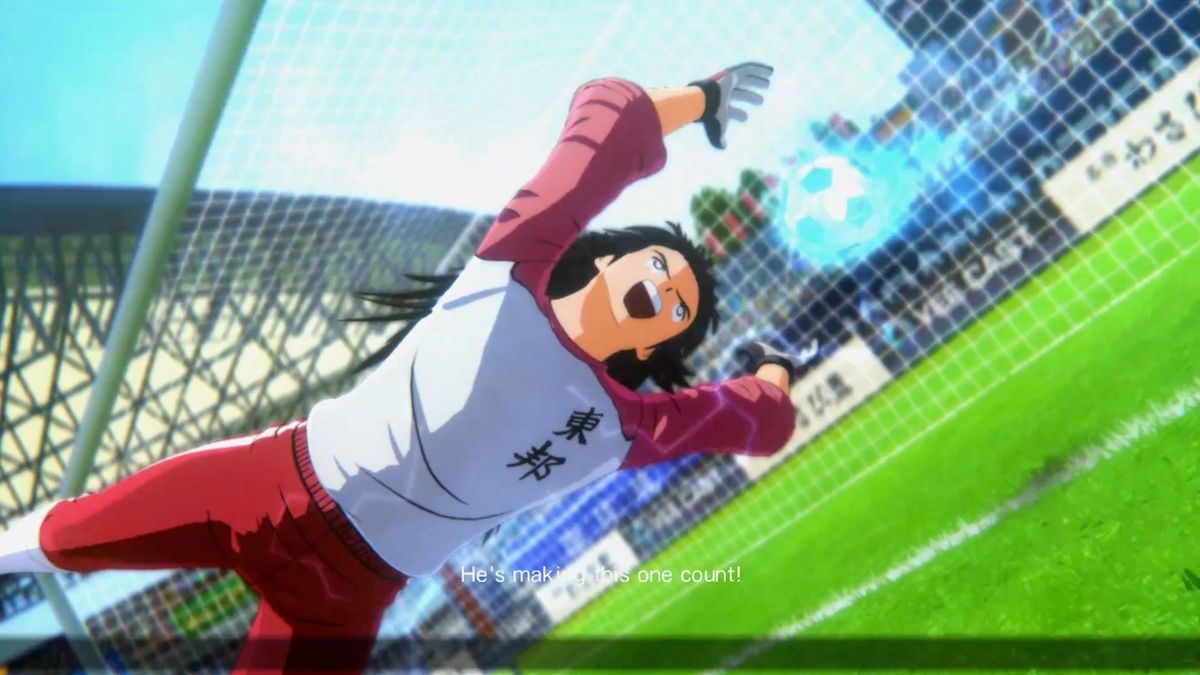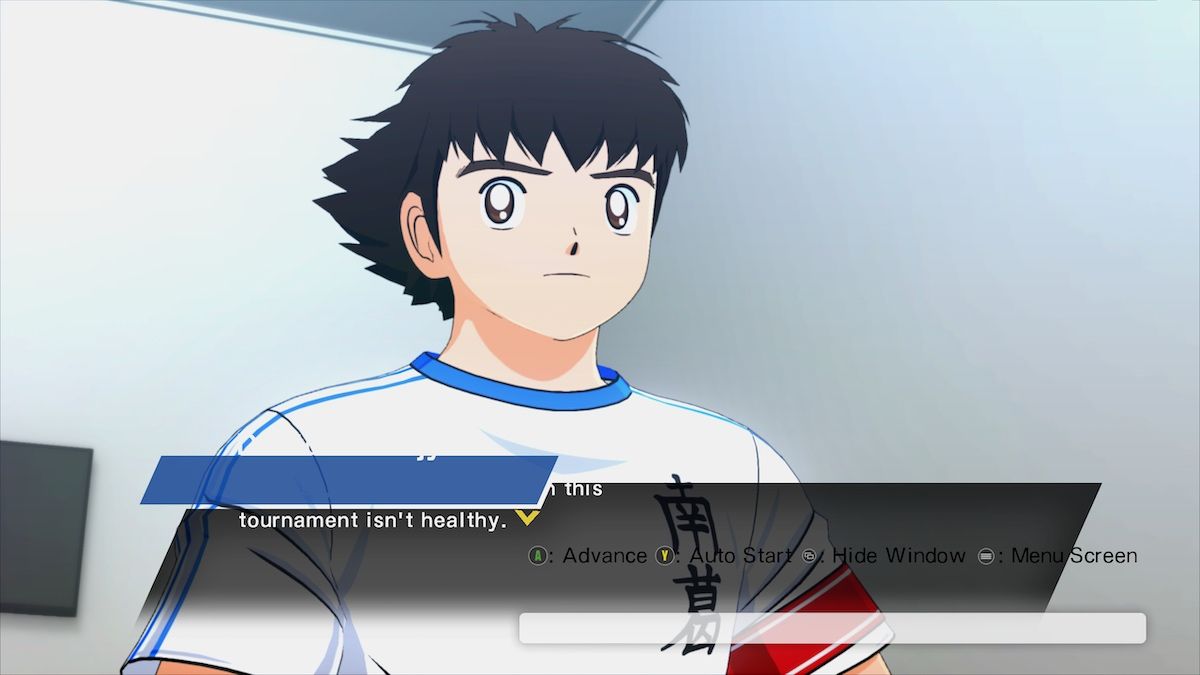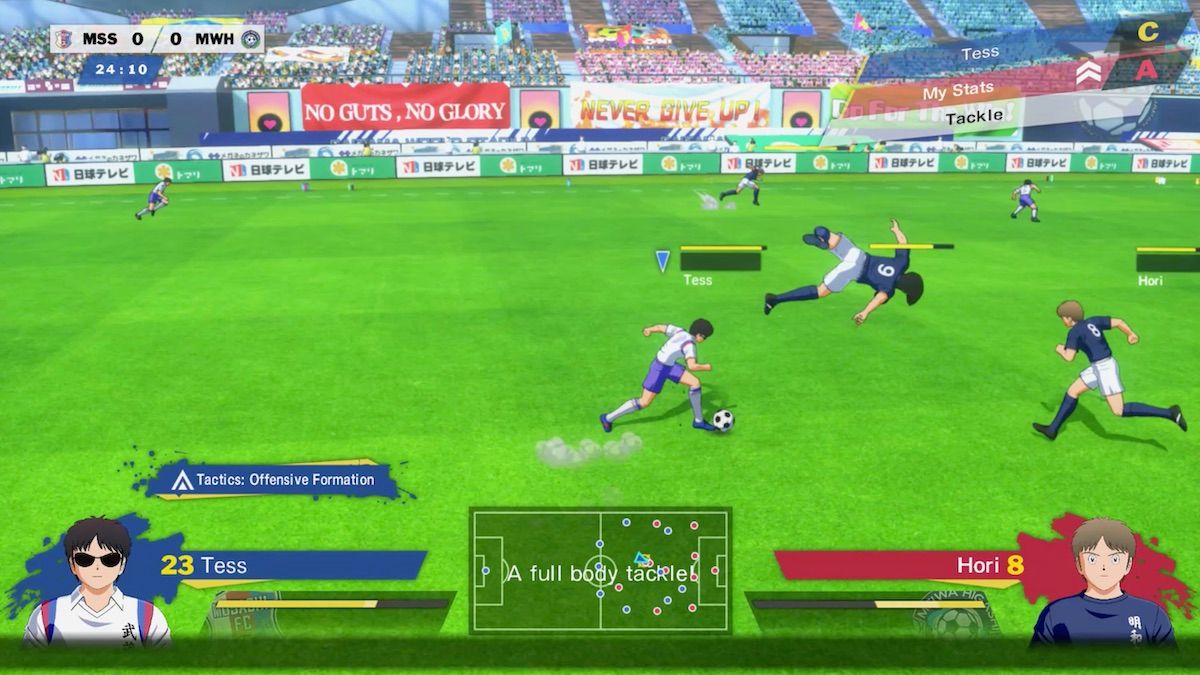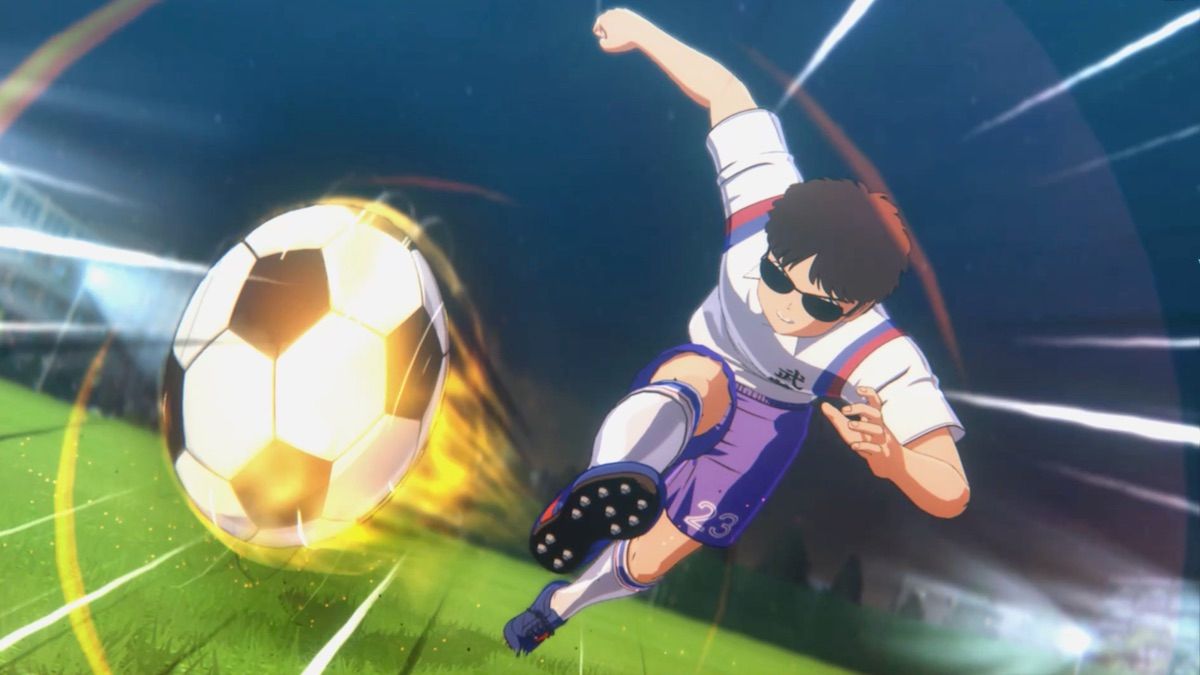Despite the dominant fascination with realism in both physics and visual fidelity, sports games thrive more so when there's a well of mechanics and inter-locking systems to work out and engage with. The "arcade" moniker to some can be misconstrued as something lesser. Something that doesn't take the sport it's representing seriously, or as might be a more fitting word with a game like Captain Tsubasa: Rise of Champions, doesn't sacrifice the need for tactics and strategy in favor of some wider-appeasing premise. Even without the relevant licenses or real-life icons, it's clear from as early as the first couple of chapters to [one of] the story modes that Tsubasa isn't afraid of letting loose and making the player think about how success is secured. Sure there's a legacy of exaggeration, dramatics, internal monologuing and all-round ridiculousness to uphold. The series is nearly four decades old at this point and there are countless times throughout the two separate story modes that the game isn't letting up on introducing a handful of new characters all at once.
This despite Captain Tsubasa, in 2020, not exactly being the most mainstream or well-known series in the West -- both in manga and anime adaptation form. Like it or loathe it, Rise of New Champions isn't shying away from having a large swathe of its cast be present. Characters whom themselves never go too long without blurting some usual nonsense on teamwork, never giving up and/or all the usual cliches you can shake a stick at. It might seem like a hard sell, all things considered. A game for fans of both the IP it's associating with as well as soccer games in general. A niche within a niche. A peculiar mix of systems-atop-systems themselves embedded somewhere amidst a cel-shaded presentation of circa-80s anime stylings. The likely response would be that Rise of New Champions is doomed to go the way a lot of anime-licensed video games have ended up recently. Prioritizing some contractual obligation of appeal with the source material over any intriguing depth of its gameplay. Average at best, a hollow cash-in at its worst.
And yet fittingly, Captain Tsubasa against all odds manages to come out of it all victorious -- bruised, a touch beaten, but having achieved what it's set out to do. There are issues a plenty to highlight as there are irks and nitpicks that could possibly add up to greater concern, but I'd be lying if I said Rise of New Champions doesn't deliver on those brilliant, emergent little moments that the best of Pro Evolution Soccer have gifted me with for many a year. Don't be fooled by the flat, cel-shaded presentation or maybe the dismissive nature of its text-heavy, diorama-enveloped narrative. Above all, do not be put off by the mantra of "anime/manga adaptation" despite what's come before. Beneath the wide eyes, laughably over-the-top spectacle and a fair few issues to raise, Captain Tsubasa is a deeper and more calculating game than many will inevitably give it credit for. Which is a shame because Rise of New Champions is a surprisingly wonderful sports title to pick apart and sink many dozen hours into.
Managing "spirit" as it's dubbed here (or stamina as you can commonly refer it to as) plays a critical part of how matches usually swing in Rise of New Champions. While tactical formations, game management and knowing how/when to run the clock down are important as they ever were, Captain Tsubasa's first enjoyment lies in the many hundred of small, split-second choices the player makes on their way to victory. While the endgame nine times out of ten is often in getting the opponent team's keeper down to low (if not entirely depleted) Spirit, the means with which this is accomplished are more complex and tactically-positioned than initially presented. Yes, Forward's can continue to lob powerful "V-Moves" -- whereby the camera enters into a dramatic, ground-level shot followed by a tense RNG on whether the opposing keeper will hold, parry or indeed let slip a ball heading straight into the back of the net. But to assume every game is dominated solely by this uncontrollable, rolling-the-dice gamble would be to miss the point of why the core loop is as addictive as it is.
Emergent and down to pure commitment some of the best moments may be. Coming from behind to snatch a late 2-1 victory; nervously running down the clock to hold onto that hard-fought 3-2 lead in a final; watching as another of the ridiculous animations renders an aerial duel for the ball in some button-mashing, flair of oranges and blues. You'd think there'd come a point where the visual effects and the need to have every encounter framed in such an exaggerated fashion would tire. But remarkably, it doesn't; for all the instances where a player is sent flying or an opponent is enveloped in some blue aura, denoting some successful dribble, the game finds a rhythm amidst all this madness. It's imperative these instances are captured, it says, but above all else there's the acceptance above all else: there's a match to be played. The spectacle and the mechanics run side by side and entertainingly so.
The first hour will of course be the trickiest and most unrewarding part of playing Rise of New Champions, but it's to the game's credit that players will slowly-but-surely ease into proceedings. Most games in the first half of either of the two story modes can be won without the need to know such things like combo moves, aerial headers or even how to expertly dribble the ball past two or three opponents at once. It may seem like you're merely brute-forcing your way with opportune shots, but there are always threats to consider and tackles to make and it's because the game acknowledges these many decisions taking place at once, that the gameplay is allowed to breathe. Tutorials too are provided at a consistent pace and even allows players to practice before the start of a crucial match. It isn't long then, once you get the hang of how Spirit meters and V-Focus and how keeping tabs of where players are positioned (do you, for example, have time to charge a powerful shot or not?) work, do the more advanced tricks and abilities feel less like an impossibility and more an eventual, useful in-road to some truly great moments to look back on.
The best compliment you can give here is that Tsubasa doesn't let the indulgence of its intellectual property over-shadow the nitty-gritty players will eventually have to invest in so as to better plan their moves. Even if it's somewhat off-putting when two characters enter a dialogue during a match -- sometimes rendering them miraculously standing off-pitch in the next instance. Take away the license, however, and you're still left with an interpretation of arcade soccer (entirely dismissive of basic physics it may be in some specific moments) whose best aspects are rewarded to those who think long-term. Thus the more you commit to the gameplay, regardless of off-pitch dramatics, the more you understand that Tsubasa places cause-and-effect dynamics at its spectacle's heart. Regardless of how many times the soccer ball before you looks less like a ball. Failing that and it isn't long before you're met with a lethal counter from the opponent team. Or a lack of managing your team's collective Spirit meters, means you can't make it in time to deliver those decisive shots or crucial tackles. Opponent players easily dealing with the threat you pose, as your currently-offensive, narrow-minded strategy is blown apart.
There are moments when the intellectual property side of things does wrestle its way too much into proceedings. How matches are broken up by a cutscene (intended to replicate some memorable moment from the series, it's implied) whereby the opponent somehow scores -- now leading 1-0 simply because the game deemed it necessary for dramatic purposes. In its defense, however, these instances are dubbed DADs in which meeting specific criteria in-game unlocks a hidden set of events that can turn the tides for one team or another. Even so, as opportunistic an easy cutscene-assisted goal might sound, it doesn't always feel like a natural transition into the circumstances preceding it. It does mean there's more for the player to consider, on top of everything else going on in an individual match. But again, Tsubasa for the most part avoids laying on its most immersion-breaking moments too thick that it undermines the mechanics underneath. A large majority of the presentation feels balanced and the resilience is why the gameplay shines as brightly as it does.
An even more crucial asset to consider, as Rise of New Champions' PC port (the version this review is based off of) is far from polished and presentable as its gameplay is. Several days after release and while there's an acknowledgement at least, the game remains let-down by a consistent issue pertaining to text layout. One that is impacting both dialogue/story cutscenes (as shown above) as well as the entirety of the menus when played in full-screen mode. Performance has also seen its fair share of problems with multiple occasions of the game crashing -- one of which occurred directly after winning a vital story match, a victory of which wasn't saved in time -- as well as the competitive online mode made entirely inaccessible due to a continuing server issue. Even on the field, individual matches can at times offer some odd behavior from AI players too. Be they members of your own team or those on the opponent's. Certain players lacking a level of awareness or even willingness to chase down a loose ball at the most crucial of moments. Even finding themselves "warp" from one point to another -- animations not always connecting or reflecting properly the action taking place.
It's a strange and admittedly awkward position to be in; Tsubasa gets a lot right when it comes to crafting a sports title that's both accessible yet compelling. But take away these major knocks against with the PC version at the time of writing this and there still remains these odd momentary annoyances that on their own are no big deal, but amalgamated together do start to grate. If it's not the reliance once more in having characters stand idly in pre-rendered dioramas so as to unload plot exposition, it's the lack of time player-made characters are given to choose a response from out some momentary dialogue option. For every two or three ways Rise of New Champions manages to ride out the usual prejudices and even counter the eventual pitfalls of adaptations in video game form, there's that one lingering woe that pulls the experience close to regular mediocrity. Glaring issues with the PC version excluded.
It's grateful then that the accompanying story content -- that of which is commonplace among a lot of recent adaptations of this ilk -- is as substantial as it is. And more importantly, isn't as dedicated to the "self-insert" model that a lot of games use so freely to potentially mask a lack of originality. Because while the game does follow along the usual plot of your custom-character making their way into one of the three opponent teams introduced in the accompanying storyline, the great thing here is that you, the custom-character, are not the one-and-only focus. The obvious explanation may lie in the notion of a team and of a plot revolving around said team -- or to be more specific, the team captain similarly introduced beforehand -- but again, to the game's credit, Episode: New Hero feels more like a deeper-dive into the secondary characters the game has previously introduced. Upon deciding which team to join, there's even an introductory section of animation in which your player is nowhere to be seen. Minor a placement, it's a welcome alternative to the usual show of player-characters being far too frontal in proceedings.
And that's without getting into much detail as to the ways and means one goes about building your stats over the course of the narrative presented. How you go about interacting with many a character -- even from those on the opposing team -- building friendships, learning new skills to use in future matches. How optional challenges and features to focus on provide plenty of opportunity and flexibility to tailor both yourself and the team you're a part of. There's even an ability during this story where, when playing defensively, you can automatically select your own character in-game if you simply want to focus only on boosting your own stats. Allowing you to more quickly and efficiently improve -- each match grading individual attributes on a case-for-case basis which is helpful given a lot of optional challenges require you meeting a certain grade for a particular attribute.
Closing Comments:
There's a certain level of disappointment to shed with Captain Tsubasa: Rise of New Champions. As much as it meets (maybe even exceeds) expectations set earlier this year -- which in of itself is a notable accomplishment for any form of adaptation -- the lack of care and polish on the PC side of things at present can not go unnoticed. Even with the over-zealous use of effects and seemingly-obligated need to snapshot every significant moment mid-game, Tsubasa understands that to truly craft an entertaining sports title, it has to convince its players that the depth it houses is worthwhile. But much like the lofty heights of the best PES iterations, the game nails the tenuous, juggling of emotions that soccer can bring. Crafting on top two solid (if a touch slap-dash on presentation) story campaigns, that have all the trappings of some of the best and most resonating of emergent gameplay. I sincerely hope these issues are rectified sooner rather than later -- Captain Tsubasa: Rise of New Champions is an unabashed yet joyous rendition on what makes soccer games so good.


